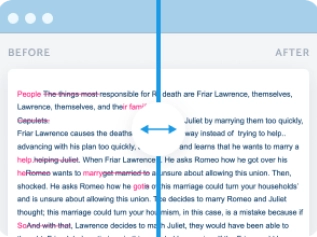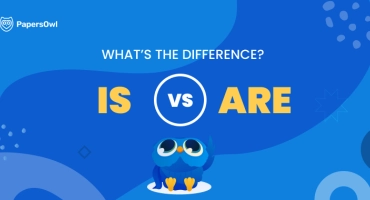4 Types of Sentences
Table of contents
- The 4 kinds of sentences are easy to spot and use in contemporary English.
- A declaration concludes with a full stop.
- A question ends with a question mark.
- Commands or requests use either a full stop or an exclamation symbol.
- Acute sentiments use an exclamation mark too.
4 Types of Sentence: Explained Clearly
Clear text composition completely depends on 4 sentence types existing in modern English. Each of the grammatical unit types has a specific function and form.
Understanding the grammatical constructions of these four kinds of sentences is important for writing any text, from school essays to advanced articles, including understanding master’s degree usage.
- Declarative — provide facts or points of view | “a subject + a verb” and a full stop at the end are compulsory constituents | in rare cases, one of them may be missed
- Interrogative — ask questions | the subject and verb may switch | apply special question markers to express a query
- Imperative — give a command or request | the subject is often hidden | the person addressed is implied
- Exclamatory — show elevated or amplified feelings | utilize heightened words and an exclamatory symbol | express surprise, anger, or joy
Knowing these types of sentences in English improves composing skills. Additionally, always remember to use punctuation correctly to express ideas in essays, articles, or any written language more effectively. This is a common task in educational institutions and helps convey your structured ideas and viewpoints.

Declarative Sentences
They share facts or opinions and end with a full stop. The pattern is subject + verb + object. This creates a complete sentence with independent clauses.
- Goal: Share a fact or opinion.
- Punctuation: Period (.)
- Pattern: Subject + Verb (+ Object)
- Examples:
- “The sun sets in the west.”
- “I enjoy writing.”
- “Students learn new words every day.”
- Typical mistakes: Adding “!” when there is no emotion.
Interrogative Sentences
These ask a question. Students often wonder, what type of sentence is this? It ends with an interrogation symbol. This signals that the exact grammatical structure asks for information.
Forms include wh-questions, yes/no, and tag questions using interrogative form. For correct grammar, use inversion or do-support.
- Goal: Ask a question.
- Punctuation: Question mark (?)
- Pattern: Wh-word / Auxiliary + Subject + Verb
- Examples:
- “Where is my book?” (wh-question)
- “Do you like pizza?” (yes/no, do-support)
- “You’re ready, aren’t you?” (tag question)
- Typical mistakes: Forgetting inversion or skipping the helping verb.
Imperative Sentences
They give orders or polite appeals. For this purpose, they can end with a full stop or an exclamation point, depending on tone. The subject is usually hidden; the verb shows the action.
- Goal: Give a command or request.
- Punctuation: Period (.) or Exclamation mark (!)
- Pattern: (You) + Base Verb
- Examples:
- “Close the door.”
- “Don’t run.”
- “Let’s start the game.”
- Typical mistakes: Adding the subject “you” twice, or overusing “!”.
Exclamatory Sentences
They show strong feelings for readers. The four types of sentences are incomplete without them.
They always end with an exclamatory symbol, forming the exclamative form. In fact, any statement can become exclamatory by adding strong words and an exclamatory symbol.
- Goal: Express strong emotion (surprise, joy, anger).
- Punctuation: Exclamation mark (!)
- Pattern: Any clause + “!”
- Examples:
- “What a surprise!”
- “That’s amazing!”
- “I can’t believe it!”
- Typical mistakes: Confusing them with declarative sentences. Example: “The sun sets in the west!” is declarative with emphasis, not exclamatory.
Mastering sentence types can greatly enhance your writing. Check out more tips and examples on the difference affect vs effect to improve your sentence structures and avoid common mistakes.
Sentence Types by Structure
Students need to have expertise in types of sentence structure. Each structure has a function and form that affects the senses. This guide explains the main structures with examples for easy practice.
| Sentence Type | Definition | Example |
| Simple Sentence | A simple grammatical unit contains one independent clause. It has a subject and a predicate. Depending on the declarative form or command, use a full stop or exclamation point. | “The cat sleeps on the sofa.” |
| Compound Sentence | A compound grammatical unit joins two independent clauses with a coordinating conjunction (for, and, nor, but, or, yet, so). Each clause can stand alone as a declarative sentence. | “I went to the park, and my friend stayed home.” |
| Complex Sentence | A complex grammatical unit has one primary statement and at least one subordinate unit. The subordinate unit cannot stand alone, but adds meaning to the primary statement. | “Although it was raining, we continued our walk.” |
| Compound-Complex Sentence | A compound-complex grammatical unit combines two independent clauses and one or more dependent clauses. This structure shows advanced structure and improves the structured form. | “I finished my homework, and my brother watched TV while our parents cooked dinner.” |
Cheat-Sheet Table
Here is a cheat sheet summarizing the 4 types of sentences with examples. It is perfect for quick reference or printing as a PDF for classroom use.
| Type | Purpose | Ending punctuation | Typical patterns | 3 quick examples | Pitfalls |
| Declarative | Share a statement or opinion | Period | Subject + Verb + Object | I like ice cream; Cats sleep all day; Water boils at 212°F | Using ! unnecessarily |
| Interrogative | Ask a question | Question mark | wh-Word + Auxiliary + Subject + Verb | Where is my book?; Do you like pizza?; You’re ready, aren’t you? | Forgetting do-support |
| Imperative | Give a command or polite appeal | Period/Exclamation mark | (You) + Base Verb | Close the door; Don’t touch that; Let’s start the game | Adding the unnecessary subject “you” twice |
| Exclamatory | Express a strong feeling | Exclamation mark | Any clause + ! | What a beautiful day!; Watch out!; That’s amazing! | Confusing with declarative sentences |
Practice Section
This practice section helps students understand what are the different types of sentences. Follow the instructions to improve your grammar and text composition. Teachers and parents can use this worksheet to communicate lessons effectively.
Identify the Sentence Type (10 tasks)
-
-
“Close the window” → ___
Imperative
-
“Where is my notebook?” → ___
Interrogative
-
“The sun is bright today” → ___
Declarative
-
“Don’t forget your homework” → ___
Imperative
-
“What a surprise!” → ___
Exclamatory
-
“She likes chocolate” → ___
Declarative
-
“Can you help me?” → ___
Interrogative
-
“Let’s go to the park” → ___
Imperative
-
“I enjoy reading books” → ___
Declarative
-
“Wow, that’s amazing!” → ___
Exclamatory
-
Rewrite into Another Type (10 tasks)
-
-
Declarative → Interrogative: “You finished homework” → ___?
“Did you finish homework?”
-
Interrogative → Exclamatory: “What a beautiful day” → ___!
What a beautiful day!”
-
Imperative → Declarative: “Close the door” → ___
“You should close the door.”
-
Declarative → Imperative: “You need to study” → ___
“Study now”
-
Exclamatory → Declarative: “I can’t believe it!” → ___
“I cannot believe it.”
-
Interrogative → Imperative: “Can you pass the salt?” → ___
“Pass the salt”
-
Declarative → Exclamatory: “I won the match” → ___!
“I won the match!”
-
Imperative → Exclamatory: “Watch out” → ___!
“Watch out!”
-
Exclamatory → Interrogative: “What a storm!” → ___?
“What a storm?”
-
Declarative → Interrogative: “She is late” → ___?
“Is she late?”
-
Add the Correct Punctuation (5 tasks)
-
-
“Please sit down” → ___
“Please sit down.”
-
“I can’t believe it” → ___
“I can’t believe it!”
-
“Are you ready” → ___
“Are you ready?”
-
“Stop right there” → ___
“Stop right there!”
-
“What a view” → ___
“What a view!”
-
Final Advice
You occasionally write regardless of who you are ─ a writer, student, or astronaut. That is why you must be able to identify different types of sentences to write smoothly.
By learning how to employ declarative, interrogative, imperative, and exclamatory sentences, you can create texts that convey your message clearly.








